- Home
- Michelle Hodkin
The Reckoning of Noah Shaw
The Reckoning of Noah Shaw Read online
Thank you for downloading this Simon & Schuster ebook.
* * *
Get a FREE ebook when you join our mailing list. Plus, get updates on new releases, deals, recommended reads, and more from Simon & Schuster. Click below to sign up and see terms and conditions.
CLICK HERE TO SIGN UP
Already a subscriber? Provide your email again so we can register this ebook and send you more of what you like to read. You will continue to receive exclusive offers in your inbox.
For Janie, may her memory be blessed.
And for my grandfather, Robert Kramer, the strongest person I know.
Mara,
If your story was a memoir, then mine is a confession. My confession is that I regret it. I never thought it was possible. I didn’t think there would ever be a day, a moment, a second, when I would look back and wish I’d never met you, but that is my every moment, now.
You are an ocean away at a café on Fulton Street. We’ve been there together, I know the address and the name. But you aren’t with me. And I miss you. You are missing from me.
I want you here, now, more than I’ve ever wanted you anywhere. I want to breathe you, drink you, devour you—I want you inside me so that I never have to miss you again.
I want to own you, is what I want, and yes, I do know how fucked up that is, thanks. But we’ve always been fucked up, really, and we said we would never lie to each other, didn’t we? (Though, we have lied to each other, haven’t we?) So I’m telling you the truth now. I want you to belong to me. I want to ask you if you’re mine, and I want you to say yes.
It’s funny, or not funny, but ironic, but not really ironic—the point is, once, not very long ago in fact, I claimed you before I’d even kissed you. I did it so easily, thoughtlessly, because we both knew it wasn’t real, though I knew, even if you didn’t, that I wanted it to be real. And then, after I did kiss you, there was a time when you wanted me to claim you. I could ask “Are you mine?” and you would say yes.
But I can’t ask you now. Or I could, but I don’t know what you’ll say anymore, and I’m too much of a pussy to risk it. So I’m writing this to you, even though you’re never going to read it, in the hope that I can exorcise these thoughts, these words from my mind. Are you mine? Were you ever mine? Or were we always what we said we’d never be, idiots who made promises to each other that we would choose not to keep?
Because it is a choice, after all. You can choose to be claimed, or refuse. You can choose to claim someone, or choose not to. You can leave them unclaimed, alone. And no matter what we say to each other—no matter what we’ve said to each other not even two weeks ago, breathless and sweaty with love in our eyes and lies on our tongues, both of us knew, and know, the truth. You are not mine. You never were mine. But right now, I feel like I would do anything to have you—leash you, cage you, trap you, so that you’ll have to be mine, whether you want it or not.
You once told me that you were poison, and I was the drug that made you forget it. You were right and wrong; I’m not a drug, I’m a wound. And your poison is in me.
It feels like lightning and tastes like sugar, a fevered sweetness that I would give anything, anything to forget. I would tie stones to the memories of you and drown them before tying myself to you again. I would beg for nothingness, pray for blankness, but there’s no one to beg. I know no God but you.
I have nowhere to send this, and no reason to believe you wish to receive it. I can feel the night behind me as I write these words to feed to the flames. You wrote because you had something to prove. I write because I have to speak, and there’s no one left to listen.
Yours, still,
Noah
Part I
The truth is a snare: you cannot have it, without being caught.
—Søren Kierkegaard
1
MY TRAGIC HEROINE
THE DAY STELLA JUMPED, THE day Mara left, her grandmother turned up in a white dress and a black car and told me to get in if I wanted to save her.
She looks so much like Mara.
Or rather, she looks like someone Mara’ll look like someday, a living, breathing perversion of her. The shadow of laughter behind her eyes when something amuses her but she won’t share. When Mara closes her eyes to search for just the right word, she closes hers as well. The shape of Mara’s mouth when she’s hiding a secret behind her lips is the shape her grandmother’s takes, too.
The first thing I asked her wasn’t how she was alive or why, but—
“What shall I call you?”
She sits beside me, looking straight ahead, but I see her smile in profile. “I told you my name.”
“I can’t call you . . .”
“Mara?” She finishes for me. “Why not?”
Because her name sticks in my throat. Because the sound of it might kill me.
“It was my name first,” she says.
Her voice snaps me back to attention, to this moment, facing this not-Mara beside me.
“Fine,” I say. “Your family name, then.”
“Which one?”
Her eyes are quick, laughing.
“If you don’t give me a name, I’ll choose one for you myself,” I say.
She arches an eyebrow. “Go on, then.”
My thoughts are furred, though, and even as I try and think the name Mara, I’m hardly able to get past the first letter.
“M,” I say.
One of her hands reaches for the collar of her white silk dress. She rubs the fabric with her thumb and studies me. “Good choice,” she says eventually.
Her stare is bold, unflinching, and as the silence stretches between us, I feel more exposed, more raw. “Why are you here?”
She blinks, once. “I told you. I need your help.”
A matter of life and death, she said. Someone we both love.
“Right. That got me in the car,” I concede. “But I’ll need more if you want me to stay.”
She watches me, unnaturally still and calm. “You have questions.”
“You have no idea.”
That cryptic, smug smile again. “I have some idea.”
It helps, her smiling like that. It’s harder to be awed by someone so irritating. “Your family thinks you’re dead,” I say.
“Yes.”
“Mara saw it.” Not strictly true, but it catches M’s attention.
“What did she say?”
I reach back through the door in my mind, the one I closed on Mara minutes or hours ago, God knows which, wincing in anticipation of the memory of her voice, and hear—
Nothing. Silence.
M waits.
This is what I remember instead: my father’s ghastly Florida mansion. An unused sitting room with furniture draped in drop cloths. Mara’s tentative, shaking hands lifting a soft, crude little doll between two pinched fingers, then tossing it forcefully into a fire. The smell of burning hair. The curl of singed paper.
That was what we thought was left of Mara’s grandmother—that doll, the pendant sewn inside of it, and the ashes of her suicide note. The note Mara saw—remembered—M writing.
I look at her grandmother now and consider, not for the first time, that I might be well and truly mad. Maybe something broke in me the moment Mara left. Maybe it broke before.
It’s a strange and unfamiliar sensation, not knowing whether to trust your own mind. Not knowing if your own senses are betraying you. I never quite got what it was like for Mara, when we met. Never quite understood why she’d wanted me to keep that journal, writing about her, for her, when she thought she was losing her mind. Losing herself.
I’m beginning to get it now.
M watches me expectantly, head tilted, a fall
of black hair curling on her left shoulder.
“Mara said you killed yourself when she was three days old,” I manage to say.
“That is what her mother believes, and so that is what she was told.”
Told? “No. Mara saw you. She remembered—”
Everything. Mara remembered everything, and she recounted it in extraordinary detail. The scents of the village her grandmother had lived in as a girl. The hushed voice of an older girl sitting beside her, sewing her a friend. My own memory of that day plays like a silent film in my mind; Mara desperate for answers, Mara desperate for my help. Mara’s face open and earnest and trusting—
The memory stings, and I shy away from it. “Did you come back?” I ask stupidly, filling the silence to drown out my thoughts.
“From . . . ?”
“Did you die?”
“Not yet.”
A start. “How old are you, then?”
“How old do I look?” she asks, amused.
Mara and I did the maths once, back when I’d found a photograph of my mother at Cambridge, with M standing beside her. My mother couldn’t have been more than twenty-one, twenty-two perhaps. The woman sitting beside me looks exactly the same.
“I don’t know,” I say casually. “Thirties, I suppose?”
She tips her head, acknowledging. “Thirty-six.”
“How long have you been thirty-six?”
“A while.” She grins, light and teasing.
“Cute,” I say. The car hits a pothole, reminding me that we’re being driven somewhere. Which begs the question—
“Where are we going?” I glance out the window, but all I see is city, still, and traffic.
M doesn’t answer right away. When I turn around, her expression’s shifted again, into something blank and unreadable. And then she says, “Home.”
2
FOR WHICH I AM WILLING
MY FIRST INSTINCT IS TO think: I’m homeless. Mara was my home and I left her, scorching the earth behind me. I burned down our house thinking it would set me free, but instead I’m like a dog, circling the ashes, hoping the only family I’ve ever known will one day come back.
I say none of this, obviously. Instead, I ask, “Which home?”
“The flight will take you back to England.”
“England? Why?”
“I told you—”
“You haven’t told me anything,” I say, feeling frustrated and bitter and sorry for myself.
M, meanwhile, is maddeningly calm. “I told you it’s a matter of life and death, which is true. I told you I need your help, which is also true.”
“Why me? I’m sure Mara would be quite interested to meet you,” I say, gauging her reaction.
“She can’t know about me, not yet.”
“And what if I tell her?”
“You won’t,” she says plainly. She looks out the window at the passing streets. “Mara’s chosen a different path, and a different person to lead her through it,” she says to the glass. Then, to me, “If she reaches out to you again, it won’t be her reaching. It’ll be him.”
Him.
She could be referencing almost anyone, technically, but the pendant around my neck feels heavy, oppressive, and my anger knows its target. “The professor.”
She nods once.
“How do you know who she’s with right now? What she’s doing?”
“Just because I can’t see the people I care about doesn’t mean I’ve stopped caring. Surely you understand that.”
An artful dodge. “You haven’t answered the question.”
Her expression shifts. “It would be hard to explain if I had a lifetime to do it, let alone a single conversation,” she says, sounding older for a moment. Her left hand drifts to the collar of her dress again, but this time, her thumb rubs the hollow of her throat. “We’re connected to those who share our Afflictions,” she says. “Particularly those who share our genetics.”
My mind darts back to Mara, to Florida, to her memories of M. To the book I’d thought I found at random, New Theories in Genetics, authored by the professor, though I didn’t know it then. “Genetic memory,” I say aloud, remembering the passage I read to Mara. An explanation for what was happening to her, impossible as it seemed.
M smiles approvingly. “Some of us find ourselves remembering things that didn’t happen to us, but rather someone who shared our Afflictions, or our genes. A relative, usually, but not always.”
I think of what she said about Mara, and what M seems to know about her now. Has she lived any of Mara’s memories? “Does it go both ways?” I ask.
“It can.”
“But I’ve never experienced . . .” What are they? Fits? Hallucinations? “Memories. Not like that.”
“Because you’ve closed yourself off from them,” she says.
I bristle at her tone. “You seem quite sure about that.”
She ignores my stare, looking out the window instead. “If your mind was as open as Mara’s, she would be here and safe.”
She doesn’t finish the rest of that sentence, so I do. “Here and safe, instead of with the professor and not, you mean.”
A pause. “Something like that.”
Anger rises, coiling at the back of my throat. I gave Mara a choice; she chose not to be here. “Hate to be the bearer of bad news,” I say, “But if Mara’s with the professor right now, it’s likely his safety you ought to be worrying about.” She doesn’t respond. “Right, I think we’re done here—”
“The professor was my professor, once,” she says, cutting me off. Then turns to stare at me directly. “Did you know?”
Words written in elegant longhand appear in my mind.
Mr. Grimsby calls him the professor, and everyone seems to accept that.
“He was my tutor,” M continues. “When I was first brought to London.” She swallows. “I know him. He’ll use her as he used me.”
The words hang in the air, sticky and rotting. “I’m sorry,” I say carefully. “For whatever . . . happened. But I don’t know what you expect me to do about it.”
She exhales through her nose. “Mara’s memories of me helped her understand what was happening to her. She found answers in them, sometimes to questions she couldn’t voice.” She leans forward slightly, encouraging. “I think you’ll find the same is true for you, and that once you let them in, you’ll unearth answers that can help her.”
“How would my memories help her?”
“You’re her balance,” she says.
Her words provoke a bitter smile.
“Your fates are tied together.”
You will love him to ruins.
I feel ruined. Ruined and wretched. Maybe fate was right.
“I don’t believe in fate,” I say indifferently.
“You don’t have to. You’re connected to each other, in ways you can’t begin to appreciate. She needs you.”
My voice goes flat. “She doesn’t need anyone. She can take care of herself.”
“You’re wrong about that.”
“Am I?” She seems genuinely hopeful, which only proves that whatever she thinks she knows about Mara, whatever she’s seen, fails to account for one fundamental truth:
“Mara doesn’t want help,” I say. She doesn’t want to be fixed. She doesn’t need to be saved.
“She does.” The way M says it, I half-wonder whether she’s heard the thoughts I haven’t voiced.
“She does want your help. She just doesn’t know it yet. But she will, and it will bring her back to you.”
It is shameful how badly I want that to be true. To realise that that’s why I’m still sitting here, allowing myself to be led by the collar in the hope that I’ll be taken in a direction that’ll bring her back to me. I might’ve thrown Mara away, but I haven’t let her go. Not really. Not yet.
“If you believe that, then you don’t know her any more than you know me,” I say, rather snottily.
She looks at me, her dark eyes narrowing s
lightly. “Your mother’s chin would lift and her lip would curl in exactly the same way yours is doing right now, when she got defensive. And you could always tell David Shaw was lying if he met your gaze without blinking.”
The mention of my parents brings me up short. I swallow hard, collecting myself. “You knew them. You don’t know me.”
“Perhaps I know more than you think.”
Whatever cards she thought she was playing, she’s played them wrong. “I guess we’ll never know,” I snap. Then, leaning forward, “Stop the car,” I say to the driver.
The driver meets M’s eyes in the rearview mirror. “Ma’am?”
“Keep going,” she says to him. Then, before I can protest, “I didn’t just know your parents,” she says. “I knew everyone in your family—or at least, everyone after the first Simon. You were supposed to have his name, actually.”
“My father wanted me named Elliot, for his father,” I argue despite myself. I try to remember when he said that, because I’m certain of it.
“That was the compromise he reached with Naomi. She hated Simon.” She half smiles. “So you ended up with two middle names instead of merely the one.”
“Cool story,” I say tonelessly. The anger is still there, white and cold and familiar. Anger at her for tempting me, and at myself for being tempted. “I’m not interested, all right? I’ve already watched my mother die the once. I don’t need to pry open her memories and relive it.”
M looks incredulous. “Noah, your mother had an ability, but she wasn’t the only one. You did know that, right?”
Wrong. “Who else, then?”
She runs both hands through her hair, and in that moment she looks like Daniel, surprised and frustrated at once. “Your grandfather’s grandfather. The one who took me.”
“Took you?”
She inclines her head a bit. “Found me. Claimed me. Took me.”
“From whom? Where?”
“I don’t remember,” she says, her voice flattening out. Then she looks out the window, at the city. “I remember jungle. Trees that grew so thick and wild you’d think they were sentient. Stars that jewelled a sky a richer shade of indigo than the ink we used to write with.” She inhales deeply. “The words I have now can’t do it justice. And the languages I knew then were . . . not common.” She pauses a beat too long, and her tone shifts again. “Plus there was no one to talk to when I was that young, anyway.”

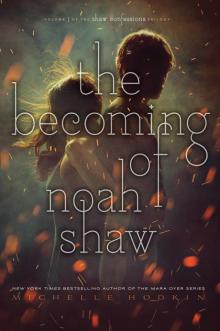 The Becoming of Noah Shaw
The Becoming of Noah Shaw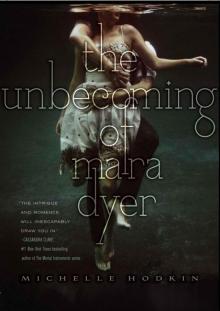 The Unbecoming of Mara Dyer
The Unbecoming of Mara Dyer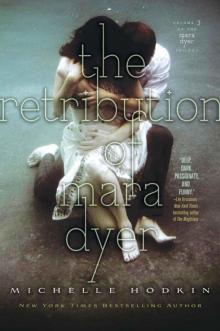 The Retribution of Mara Dyer
The Retribution of Mara Dyer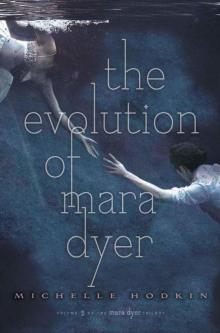 The Evolution of Mara Dyer
The Evolution of Mara Dyer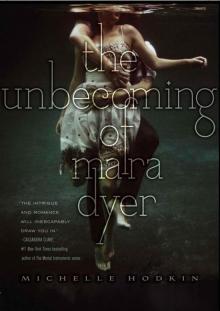 The Unbecoming of Mara Dyer md-1
The Unbecoming of Mara Dyer md-1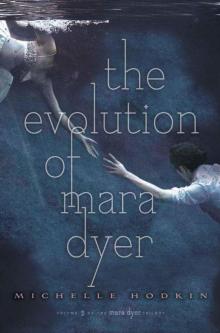 The Evolution of Mara Dyer md-2
The Evolution of Mara Dyer md-2 The Reckoning of Noah Shaw
The Reckoning of Noah Shaw